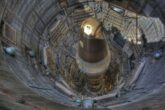August 23, 2024
There Are No Magic Beans: Easy Options to Deter China Militarily Do Not Exist
This article was originally published in War on the Rocks.
Since 1979, it has been the policy of the United States, as codified in the Taiwan Relations Act, to maintain the capacity to resist the use of force or other forms of coercion by China against Taiwan. Until recently it could be taken for granted that the United States was able to directly thwart a Chinese attack on Taiwan. But dramatic increases in China’s military capability over recent decades have called that into question, particularly with the military balance trending ever further in China’s direction for at least the near future.
With General Secretary Xi Jinping having reportedly directed his military to be ready to invade Taiwan by 2027, the United States and its allies are working on options to deter China, with a focus on denying the success of Chinese military aggression. However, given limited resources and self-imposed congressional budgetary limits, there is likely to be a strong temptation to look for less expensive solutions to deter such action. One line of thinking among some observers has been to deter China by threatening its sea lines of communication. According to this approach, in the event of a conflict, the United States could, for example, just “cut off their oil,” starving the Chinese military and economy.
Given China’s apparent plans for attacking by surprise, disrupting command and control networks, and imposing an air and naval blockade prior to an assault, the only assured way to deter an attack on Taiwan is to have sufficient survivable forces and munitions properly postured before a Chinese attack.
Unfortunately, this is magical thinking. China’s leaders identified their “Malacca dilemma” more than 20 years ago and have been taking action since to become a maritime great power and mitigate such a risk. If Washington seeks comfort in easy but unrealistic solutions, it risks undercutting support for resources that will be necessary to actually deter China militarily.
Read the full article from War on the Rocks.
More from CNAS
-
The Astronomical Cost of Defeating ‘Any Foreign Aerial Attack’
Building Trump’s proposed missile and air defense system would be an enormous task — and the president’s spending target is likely just a fraction of the final price. CNAS adj...
By Becca Wasser
-
The U.S. Military Needs to Relearn Nuclear Signaling
This deterioration matters because beyond the quantity and quality of the United States’ nuclear forces, nuclear deterrence will rest on the country’s ability to effectively s...
By Philip Sheers
-
From Production Lines to Front Lines
Executive Summary The U.S. defense industrial base (DIB) is struggling to meet the demands of the current strategic environment—let alone prepare for a potential conflict agai...
By Becca Wasser & Philip Sheers
-
More than the Sum of its Parts: Developing a Coordinated U.S.-Australian Response to Potential Chinese Aggression
If China engaged in a war of aggression, the United States, Australia, and other nations would not have much time to develop a coordinated response....
By Stacie Pettyjohn




